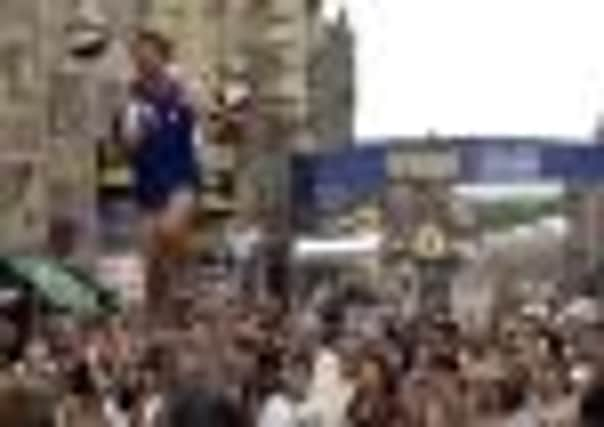Jonathan Mills: It is our artistic culture that changes society


ONE experience I brought with me from Australia in 2006, when I was appointed Director of the Edinburgh International Festival, was that of programming and promoting a large-scale cultural celebration, in close proximity to an enormous international sporting jamboree; or to be specific, the challenge of mounting the 2000 Melbourne Festival of the Arts in the shadow of the Sydney Olympic Games.
I make no assumptions about any similarities between Sydney and London, perhaps even fewer between Melbourne and Edinburgh. Nevertheless, to ignore these potential opportunities and challenges would have seemed foolish.
Advertisement
Hide AdAdvertisement
Hide AdA passing remark by Rod Kemp, Australia’s former Minister for Sport and the Arts struck a chord. He stated the obvious by observing that the portfolios of many Sports Ministers also contained responsibility for arts and culture; this is certainly the case in the UK, where Jeremy Hunt is the Secretary of State for Culture, Media and Sport.
The germ of an idea was starting to form; a reasonable assumption that many of the Sports Ministers gathered in London in late July into August 2012, to support their various national teams of athletes competing for Olympic glory, might also be able to represent their countries’ cultural ambitions in Edinburgh a few days later.
An initial conversation with Jeremy Hunt at a concert at the Queen’s Hall during the 2010 Edinburgh International Festival gave me encouragement. Subsequent discussions with the Scottish Government and British Council were equally animated. My colleagues at the Edinburgh Festival Fringe and International Book Festivals also offered support and enthusiasm. And so the idea to hold an inaugural Edinburgh International Culture Summit on 13 and 14 August 2012, on the days immediately following the closing ceremony of the London Olympic Games, started to take shape.
This was not intended as an idle fantasy; rather a recognition of the potency and popularity of what has been built in Edinburgh as a festival city. When the UK last hosted the Olympic Games in 1948, the Edinburgh International Festival was barely one year old..
Edinburgh’s festivals are simply the largest and most diverse cultural offering in the world.
And the city itself offers an elegant and vibrant setting, for a wide-ranging, high-level conversation about culture; with government ministers and artists able to exchange ideas and experiences in a location with so much artistic activity happening, quite literally, all around them.
If the setting is ideal, the substance of this summit is of ever-increasing importance too.
We have already begun to enter a period in history where no specific culture, ideology, religion or politics will be all pervasive or dominant.
Advertisement
Hide AdAdvertisement
Hide AdWe are now living in world in which knowledge comes simultaneously from various, divergent technological, ethical, philosophical, and above all, cultural sources and locations.
In a world which is facing monumental challenges, especially in light of a series of recent, acute and on-going economic crises, a summit focussing on mutual cultural interests and shared human values is both timely and appropriate.
The Edinburgh International Culture Summit is a gathering of delegations of around 40 nations held at the Scottish Parliament in a fortnight’s time; bringing politicians and policy makers together with exceptional international artists, thinkers, cultural programmers, philanthropists, and experts in the fields of technology, media, and diplomacy.
I hope it will be an outstanding opportunity to share and learn from the very best practices and innovations happening around the world.
Commissioner Androulla Vassiliou, member of the European Commission for Education, Multilingualism and Youth will lead a discussion on the role of the arts in fostering international dialogue between cultures and nations.
The contribution of practicing artists will develop the conversation further with notable contributions from the prominent theatre director Amir Nizar Zuabi and Haris Pasovic, artistic leader of the East West Centre in Sarajevo who produced plays through the long-running siege of the city in the 1990s.
Australian philanthropist, Harold Mitchell, whose personal contributions, not just in the development of music education in East Timor, but in partnership with the former president and current prime minister of Timor L’Este, Xanana Gusmão, played an important role in developing a new and emerging nation’s cultural identity and confidence. Mr Mitchell will share some of what was learnt through that experience and offers his views on possible models of funding for culture into the future.
How do governments tap into the world’s multi-billion pound film and video game industries? Has the internet strengthened or diluted a sense of cultural identity?
Advertisement
Hide AdAdvertisement
Hide AdSuch questions will be discussed and debated by the diverse range of participants and nations represented in the Cultural Summit.
With a blend of pragmatism and optimism, the Edinburgh International Cultural Summit is being held at a time of great uncertainty, in a city that transforms itself each August into a melting pot of artistic diversity.
The generosity of spirit in which artists and politicians from around the world will join together for the inaugural Edinburgh International Culture Summit, is an eloquent demonstration of the enduring importance of culture and the arts.